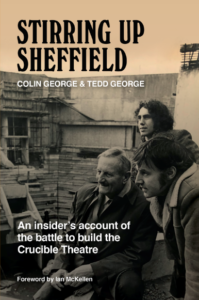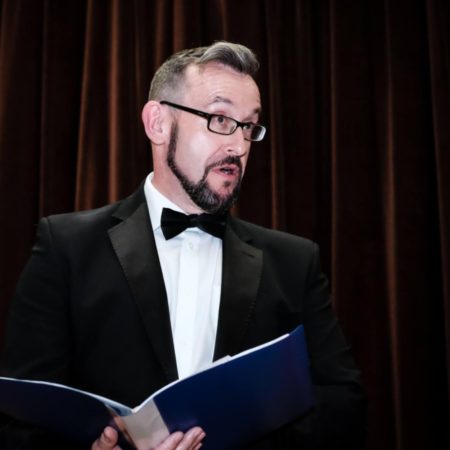A Stinging Delight by David Storey (Faber)
STR THEATRE BOOK PRIZE
Winner of the 2022 STR Theatre Book Prize (for books published in 2021)
The Society for Theatre Research was delighted to award the Theatre Book Prize to:

Stirring up Sheffield by Colin and Tedd George published by Wordville
The announcement was made by academic and author Nicola Abram who won the prize in 2021 of her book Black British Women’s Theatre.
This year’s prize presentation was a virtual event which you can see in full on the Society’s YouTube Channel:
And you can read all about it here too.
The Society’s new Chairman – Professor Michael Burden – opened the proceedings before handing over to Howard Loxton, Chair of the judging panel, to talk about this year’s books, followed by the judges.
Jatinder grew up in Nairobi, Kenya and arrived in the UK as part of the “Exodus” of Kenyan Asians in February 1968, aged 14. He founded theatre company Tara Arts in 1977 as a response to the racist murder of young Gurdip Singh Chaggar in West London. His ‘Binglish’ approach characterised a range of productions: from Gogol’s The Government Inspector in 1988 and Buchner’s Danton Death in 1989, to Moliere’s Tartuffe, which was staged at the National Theatre in 1990, where Jatinder was the first-ever non-white director.
Along with designer Claudia Mayer, Jatinder led the re-building of Tara’s home in south London to create Britain’s first multicultural theatre, fusing Edwardian brick and Indian wood. The new Tara Theatre was formally opened in September 2016 by Mayor of London Sadiq Khan. In 2017, Jatinder was made an Honorary Fellow of Royal Central; in the same year, he was awarded an MBE for services to diversity in the arts.
Erin is Head of Archive for the National Theatre. She is a current PhD candidate at the Royal Central School of Speech and Drama, where she is researching how to improve the archiving of process in theatre. She is a member of BAFTA’s Heritage Committee and the Chair of the Association of Performing Arts Collections, a subject specialist network of archives, libraries and museums in the UK and Ireland holding performing arts content.
Paul has been a theatre critic and feature writer for The Stage for more than 20 years. Other titles he has written for include Musical Theatre Review and Makeup Artist Magazine. He has acted as a judge for the Off-West End Awards, the London Cabaret Festival, the Lost One-Act Play Festival and also reviews on the Edinburgh Fringe as part of The Stage reviews team.
Chairman of the Panel was Howard Loxton of the Society for Theatre Research’s Committee.
 Howard Loxton started with an introduction:
Howard Loxton started with an introduction:
Circumstances prevailing when we had to plan this event made a return to a face to face presentation very questionable – hence the on-line presentation – but that wasn’t the only effect Covid 19 has had on the Theatre Book Prize. During lockdown, with theatres closed and productions halted making stage employment impossible, a number of show business people found time to start writing their memoirs and this year’s entries include a number of autobiographical and anecdotal titles that range from those of impresario Raymond Gubbay to stage door keeper San Evan, along with veteran performers such as Dame Eileen Atkins, Robert Gillespie and Michael Pennington, lighting designer David Collison and actors Giles Terera, Peter Bourke and Joseph Millson.
On the other hand fewer academic titles than usual have been received – perhaps everyone was kept too busy running Zoom seminars and teaching on-line.
With so many people working from home, Covid also made contact with publishers more difficult and that may have affected submissions as they were fewer this year. Subjects ranged from Shakespeare to black circus performers, theatre finance to theatre ghosts – you can find the compete long list below – and fortunately Covid didn’t stop our indefatigable judges from reading them all.
This year’s triumvirate are Erin Lee, Head of the National Theatre Archive, theatre critic Paul Vale and Jatinder Verma, theatre director and co-founder of Tara Arts.
Fortunately when the time came for them to decide on a short list we were able to meet up and a lively discussion produced the list of six titles which, just to remind you, are – in alphabetical order:
Following Howard’s introduction, the judges then spoke briefly about those short list titles and a couple of others that impressed them.
Erin Lee:
Hello, I am Erin Lee. I have thoroughly enjoyed being part of the judging panel for this year’s prize and am very grateful to my fellow judges for their wisdom, good humour and engaging conversation throughout this process. Also, a big thank you to Howard Loxton for guiding us so seamlessly through the process and to the STR for asking me to be involved.
I want to pick out a few of the books that really stuck with me and I will go through them in alphabetical order.
The first is Brickwork: A Biography of the Arches by Kirsten Innes and David Bratchpiece, published by Salamander Street Ltd. This book is a verbatim take on the history of the famous Arches venue in Glasgow from its foundation through to its closure. Told uniquely in the words of those involved it covers every aspect of the venue including programming, licensing and funding. You get a real sense of the camaraderie in the company and the challenges that they faced. A lot of the book is taken up with descriptions of the infamous club nights, which were introduced as a means of funding the venue as well as covering the DJing, live art and theatre that were part of this venue’s varied past. It is fascinating to see this very early model of private funding for a performing arts venue as we deal today with cuts to arts funding and an ever-increasing pressure on private funding streams to keep our venues alive.
In Deep are the Roots: Trailblazers who changed Black British Theatre by Stephen Bourne and published by The History Press, we are told from a very personal perspective about the pioneers of Black British theatre including some fantastic interviews with important contributors to this history. Its appendix of a database of stage productions of Black and Asian performance from 1825 to 1975 is an incredible starting point for any student or practitioner interested in exploring this area in more detail. I particularly enjoyed the blending of the first-person narrative with the rigor of academic research, making this both an enjoyable and educational read.
Hamilton and Me: An Actor’s Journal by Giles Terera and published by Nick Hern Books provides an insight into Terera’s experience of preparing for, rehearsing and performing as Aaron Burr in the smash hit musical Hamilton. This book details Terera’s approach to the role, his research and preparations from first audition right up to his performances on stage. It provides insights into an actor’s method and will have wide appeal to those who love the show and want to know more about the process of producing a play in the West End.
In Theatre and Archival Memory: Irish Drama and Marginalised Histories 1951-1977 by Barry Houlihan and published by Palgrave Macmillan, we have a thorough and detailed account of an aspect of theatre close to my heart: that of archiving. This book focuses on an under-explored period of Irish theatre history and draws on newly released and digitised archival materials to encourage a broader interpretation of historiography of this period and really highlighting the value of archival records to our future understanding of how theatre responds to political, cultural and social change.
Finally, I want to mention Work…and other four-letter words by Joseph Millson and published by Urwin Press. This warts-and-all account of Millson’s first ten years in the industry following drama school is a very honest account of the ups and downs of life as an actor with funny and heart-breaking stories, portraying an actor who is so much in love with his work. I really enjoyed reading this with its lucidity and brutal honesty about a profession we can too often view with rose-tinted glasses. I look forward to a second volume!
Overall, I particularly enjoyed the opportunity to read many books that have been published during and in response to the Covid-19 pandemic and I look forward to more of these valuable, reflective and innovative works that will come as we move out of this life-changing period in history.
I want to say thank you again to the STR for the opportunity to be part of the book prize this year and to all of the authors and publishers for their submissions.
Paul Vale:
Firstly I’d like to say what an honour and delight it has been to judge the Theatre Book Prize this year. As a theatre critic, we tend to concentrate on what happens on stage, but with these volumes we are offered insight into the lives not just of actors, but of the theatres themselves. When the books started arriving I was struck with the diversity of the titles. Some obscure and mysterious, others fairly straight forward. I have always been interested in biographies, so I was drawn to a selection of titles. The first of these ended up on our shortlist.
The autobiography that really caught my imagination was Will She Do? by Eileen Atkins published by Virago. Atkins may be a familiar name to many, but I had no idea about her background or early career. Atkins’ book is refreshingly honest, as she makes no bones about her oft documented temper or indeed her temperament. It’s equally refreshing to see that this is not just the story of an actor’s career, but of a working-class actor making her way to the West End and beyond.
Atkins paints a vivid picture of her early life, growing up on a White Hart Lane council estate before stage school, rep and idyllic summer seasons in Cornwall. Famous names are dropped occasionally but Atkins’ story isn’t a Who’s Who of the theatre world, but a matter of fact journey packed with eccentric characters and a knack for story-telling. Actors are, I suppose, storytellers by trade and Atkins never fails to be entertaining and on more than one occasion shocking.
In contrast perhaps, I also enjoyed The Performer’s Tale – Nine Lives Of Patience Collier by Vanessa Morton from Head of Zeus. It tells the fascinating story of the actor, whose career spanned the latter half of the 20th century. Morton’s thoughtfully curated biography captures fragments of Collier’s fascinating career, piecing together the engaging story of a remarkable actor. Collier may be a less familiar name than Atkins and from an utterly different background – she was a debutante in 1929 – but her career plays out against what many consider a golden age of theatre, film and television in the UK.
There were barely any books on theatre’s queer history in the competition so I read with interest This Is My Friend Sandy by Deborah Philips from Methuen Drama. Having had a massive hit in the West End with The Boy Friend, Sandy Wilson was a gay writer working at a time when homosexuality was illegal. Philips picks away at Wilson’s career and those of his contemporaries with an eye on sub-text and secrecy. She wades into the West End of the 1950s to try and piece together a picture of gay life, exploring the camp aesthetic of The Boy Friend and the imagery of later, darker pieces such as The Clapham Wonder.
Towards A Civic Theatre by Dan Hutton published by Salamander Street is one of the very few books submitted that looks to the future rather than dwelling on the past. For this reason, it was easily one of the most engaging, insightful books to emerge from the competition this year – in my opinion at least. By using contemporary examples, Hutton explores the real value of theatre in the community. Citing the ground-breaking work of Slung Low in Leeds, Hutton explores how companies are striving to adapt to the communities they serve. This book makes the reader think about what theatre is for and how it can, in an age of digital prominence, remain relevant. It too won a place on our short list.
Jatinder Verma:
It’s been a challenging honour to judge the 2021 Theatre Book Prize. “Challenging” because the Prize elicited a wide range of entries. Sifting through them has provided a stimulating journey through the lives of actors, directors, theatres and theatre movements.
Our shortlist produced David Storey’s brilliant memoir, A Stinging Delight published by Faber along with the equally brilliant story of the creation of Sheffield Crucible Theatre by Colin George & Tedd George from new imprint Wordville.
David Storey’s memoir is an acute, agonising and blunt insight into the life of one of the major writers of the last century. His recollections of rehearsals with John Gielgud and Ralph Richardson for Home leap off the page as if they were happening before your eyes. While memories of his time as a teacher in late-50s London are the stuff of plays that could yet be written. Underlying these elegant and very funny accounts is an unremitting observation of his lifelong melancholia and despair, haunted by the death of his 6-year-old brother. Unquestionably one of the books of the year.
Colin and Tedd George recall the remarkable adventure that became the creation of the revolutionary new Sheffield Crucible Theatre. Their stirring story is replete with the bureaucratic and artistic opposition aroused by the radical design Colin George proposed for the theatre, while revelling in the excitement of giving a new shape to the physical relationship between audiences and artists. How a seemingly unassuming director of a regional theatre led the creation of the visionary stage that is the Sheffield Crucible – leaving an iconic legacy in his wake – is a stirring story for our times.
David Linton’s Nation and Race in West End Revue is among other notable books this year. It offers an original take on the role the revue form played in the inter-war years in shaping and reflecting racial and national identities. Meticulously researched, the book makes a powerful argument for a wider recognition of this popular performance form in the forging of British identities before the sun finally set on the British Empire.
Helen Batten’s The Improbable Adventures of Miss Emily Soldene from Allison and Busy, a biography of a once famous opera and music hall star – makes an interesting companion piece to David Linton’s book. She attempts to recreate an even earlier era in her Improbable Adventures of Miss Emily Soldene, drawing on what Soldene herself wrote. Helen Batten charts how Soldene rose from humble Victorian beginnings, where the threat of the workhouse was ever-present, to become the toast of the London and New York stage and a formidable impresario with her own opera company, touring Australia and New Zealand. That she tore up the Victorian rule book in the process, adds to the delight of this book, as when Soldene remarks “I rode on the stage in such style, that the men in front thought I was a girl, and also forgot to laugh”!
Howard Loxton then thanked the judges for the energy and enthusiasm which they brought to their deliberations and called on Nicola Adam to reveal the winner.
After this, winning co-author Tedd George, who edited and completed the material his father left incomplete when his health made it impossible to continue, responded:
This is a wonderful moment – not just for my late father Colin George but for the George family. First off I’d like to offer congratulations to the other five books on the short list. It is a real achievement to get listed for the Theatre Book Prize and I hope it gets these books the attention they deserve. I came from a theatre family so Stirring Up Sheffield has been very much a George family production. My dad wrote the first manuscript assisted by step mum Sue and a grant from the STR, I turned the manuscript into a book incorporating material from my dad’s huge archive and from interviews with surviving protagonists from the era and my sister Lucy set up an imprint at Wordville to publish the book.
To see Stirring Up Sheffield in print in time for the 50th anniversary of the Crucible last November and to launch it on the Crucible thrust stage was the fulfilment of a dream but to winches award today is beyond anything we expected. Stirring Up Sheffield has been transformative for all of us involved in the book. My father struggled for 40 years to write about his experience as the figurehead of this enterprise to build a radical thrust stage in Sheffield, From writing the first manuscript I think he was able to come to terms with his creation and to once again feel gratitude for the opportunity Sheffield had given him.
For my sister and I Stirring Up Sheffield has opened up a whole world of creative possibilities. Both of us are published authors but like most authors we have been frustrated in our experience with publishers. Stirring Up Sheffield was the perfect opportunity and a challenge to create our own imprint and to tell stories that explore the performer/audience experience and the creative process. This book, if you like, has helped set our focus : a performing arts imprint. We’ve been busy since the imprints creation in 2021 and are about to publish our sixth book – so for a brand new imprint to win an award of this calibre is very meaningful to us and we are hugely grateful for the recognition which will spur us on in our endeavours.
I owe huge thanks to many people who were involved in enriching and perfecting Stirring Up Sheffield. First and foremost thanks to my sister Lucy who set up the Wordville imprint and has been the perfect collaborator on a book which is uniquely personal for us both. I’d like to thank Ian McKellen, who was the first professional actor to grace the Crucible stage, for a beautiful foreword for the book, and Iain Mackintosh and Anne Minors for their contributions on the Crucible’s thrust stage design. Thanks also to the many people I interviewed for the book especially the Crucible’s architect Nick Thompson, who shared so many insights into the design process, and thanks also to Paul Medcalf for doing such a beautiful job laying out the book and making the words and images work so effortlessly together. Finally I’d like to offer special thanks to the Crucible Theatre, especially to the artistic director Rob Hastie ands assistant Jackie Pass. The Crucible has welcomed the George family with open arms and has been hugely supportive of this book. I am delighted that the Crucible Theatre’s foundation myth has received the recognition it deserves.
So I’ll just finish by saying thank you to STR for recognising one of the great theatre stories that was in danger of being lost. Today few people know that the Crucible’s thrust stage design around concern, confusion even anger or that the theatre was built against huge opposition but today it has grown into the UK’s largest theatre complex outside London, Sheffield Theatres, which comprises the Crucible auditorium, the studio theatre and the Lyceum theatre. This is a testament to the people of Sheffield who took the bold decision to build a modern, radical theatre in the heart of their city and then embraced the Crucible and made it their own.
So, huge thanks to STR for this award. Lucy and I are thrilled at what this means for Wordville and I know that dad, wherever he may be, is dancing a jig.
Previous winners (by year of publication)
2020 – Black British Women’s Theatre by Nicola Abram (Palgrave Macmillan)
2019 – Dark Star: A Biography of Vivien Leigh by Alan Strachan (I B Tauris)
2018 – Year of the Mad King: The King Lear Diaries by Antony Sher (Nick Hern Books)
2017 – Balancing Acts by Nicholas Hytner (Jonathan Cape)
2016 – Stage Managing Chaos by Jackie Harvey with Tim Kelleher (McFarland)
2015 – The Censorship of British Drama 1900-1968 by Steve Nicholson (University of Exeter Press)
2014 – Oliver! by Marc Napolitano (Oxford University Press)
2013 – The National Theatre Story by Daniel Rosenthal (Oberon)
2012 – Mr Foote’s Other Leg by Ian Kelly (Picador)
2011 – Covering McKellen by David Weston (Rickshaw Publishing)
2010 – The Reluctant Escapologist by Mike Bradwell (Nick Hern Books)
2009 – Different Drummer: the Life of Kenneth Macmillan by Jann Parry (Faber & Faber)
2008 – Theatre and Globalisation: Irish Drama in the Celtic Tiger Era by Patrick Lonergan (Palgrave Macmillan)
2007 – State of the Nation by Michael Billington (Faber & Faber)
2006 – John Osborne: A Patriot for Us by John Heilpern (Chatto & Windus)
2005 – 1599: A Year in the Life of William Shakespeare by James Shapiro (Faber & Faber)
2004 – Margot Fonteyn by Meredith Daneman (Penguin/Viking)
2003 – National Service by Richard Eyre (Bloomsbury)
2002 – A History of Irish Theatre 1601-2000 by Christopher Morash (Cambridge University Press)
2001 – Reflecting the Audience: London Theatregoing, 1840-1880 by Jim Davis & Victor Emeljanow
– (Iowa University Press/University of Hertfordshire Press)
2000 – Politics, Prudery and Perversions…. Censoring the English Stage 1901-1968 by Nicholas de Jongh (Methuen)
1999 – Garrick by Ian McIntyre (Allen Lane)
1998 – Threads of Time by Peter Brook (Methuen)
1997 – Peggy: the Life of Margaret Ramsay, Play Agent by Colin Chambers (Nick Hern)
Book Prize Archive
The Book Prize has been awarded each year since 1997.
Click on the links for more information.
2021 (books published 2020)
2020 (books published 2019)
2019 (books published 2018)
2018 (books published 2017)
2017 (books published 2016)
2016 (books published 2015)
2015 (books published 2014)
2014 (books published 2013)
2013 (books published 2012)
2012 (books published 2011)
2011 (books published 2010)
2010 (books published 2009)
2009 (books published 2008)
2008 (books published 2007)
2007 (books published 2006)
2006 (books published 2005)
2005 (books published 2004)
2004 (books published 2003)
2003 (books published 2002)
2002 (books published 2001)
2001 (books published 2000)
2000 (books published 1999)
1999 (books published 1998)
1998 (books published 1997)


